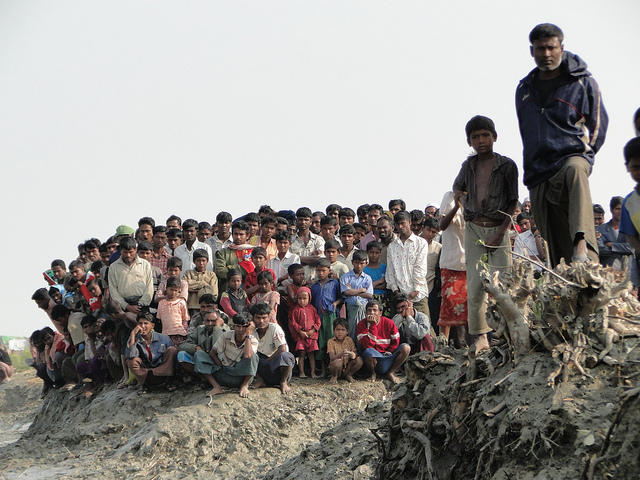
Early last month, 80 Muslim Rohingya from Rakhine state were detained by local police on an island off Sumatra as they made their way to Malaysia. On the previous day in East Java, Rohingya were caught in hiding as they awaited their escape vessel, en route to Australia.
This wasn’t an isolated event—it follows a brawl between 117 Rohingya asylum-seekers and 11 Buddhist fishermen from Myanmar that left 8 dead and 15 wounded, officials said. A police report obtained by the Democratic Voice of Burma implicates five of the fishermen in two separate gang rapes and a third sexual assault case while in detention in a Belawan town hall. The Thai Navy often deny Rohingya asylum-seekers the ability to come ashore, and Thai authorities have even been accused of firing on them or selling them on to traffickers.
The latest bloodshed highlights more than continued tensions between Rohingya and Buddhists. It crests a growing wave of people moving from Myanmar and reaching the shores of our neighbours, and the poor state of immigration protocol in Indonesia. Tens of thousands of Rohingya have arrived in Indonesia by boat since violence spiked last July. Almost every displaced Rohingya interviewed in Indonesia intends to come to Australia; more than 130 Rohingya have been stopped en route to Australia this April alone.
The spike in Buddhist-Muslim clashes reminds us of the challenges faced by Myanmar in reining in sectarian and ethnic violence in the country. A military solution to civil unrest is not typical of democracy, a political ideal President Thein Sein is lauded for aspiring to. But it isn’t just the junta that need to address the Rohingya issue.
Myanmar’s age old anti-Muslim sentiment is spreading. Some Buddhist monks taking part in the violence are affiliated with the ‘969 Movement’ responsible for mobilising much of the anti-Muslim sentiment. In late March, the army was sent in to Meiktila in central Myanmar to quell riots that spread through the city which left more than 20 people dead. Mobs spread to neighbouring towns, ‘destroying buildings and killing people’. An April Human Rights Watch report says the systematic targeted killing of Rohingya in Myanmar is tantamount to genocide; describing Myanmar soldiers digging mass graves and forcing people to dig their own. Deep-seeded sectarian conflict in Myanmar is being allowed to flourish under Myanmar security forces that play by their own rules, as Andrew Selth observes.
Bangladesh shares the Rakhine state border with Myanmar and houses a large cohort of Rohingya. The instability is spreading from the borderlands with Bangladesh to the West and into the country’s heartland. In Yangon on April 2, 13 Muslim students were burned in a suspected arson attack on a madrasa. It spreads still further in Central Asia, with scattered street and cyber protests refreshing coverage of the persecution. However, a recent protest conducted by All India Muslims Majlis-e-Mushawarat in New Delhi suggests a pan-Islamic sentiment may finally be creeping in on the tragedy of the Rohingya’s predicament, and fresh protests in Indonesia by Muslim cohorts calling for jihad could indicate its Southeast Asia trajectory.
As Myanmar opens up, ethnic and border issues will no longer be localised problems. Professor Peter Drysdale of ANU’s Crawford School notes the vast natural resource capacity of Myanmar and the economic and political opening of the country that will see further expansion of mining and infrastructure projects. This means more contact between persecuted ethnic groups in Myanmar and the outside world, as FDI floods into the country alongside aid and international media.
Genuine reform of Myanmar’s Army and Police forces is essential to legitimate and meaningful social, political and economic reform, and to see an end to the displacement of persecuted minorities. This can only happen from within Naypyidaw, aided by a veritable program of engagement from the international community. If Myanmar’s security forces remain decentralised it will continue to push issues of security and ethnicity around its plate.
Indonesia is being directly impacted by the Rohingya displacement. It could use its central role in ASEAN to move for serious consideration of Rohingya’s case for asylum, as other states in the region are affected as well. In fact Bangladeshi Foreign Minister Dipu Moni met with Indonesian Foreign Minister Natalegawa alongside the Bali process to discuss the Rohingya crisis.
Australian Foreign Minister Bob Carr and Marty Natalegawa chaired the Fifth Bali Process on People Smuggling, Trafficking in Persons and Related Transnational Crime on 3 April. Australia refugee processing policy has been criticised by the UN for breaches of International and Human Rights Law, and Indonesia has not signed up the UN Refugee Convention. This being said, Rohingya are not recognised as citizens in Myanmar, neighbouring Bangladesh, nor in Indonesia or Australia. This hinders their applications for asylum and eligibility for aid.
Australia is yet to commit to bankrolling an extended regional border patrol, or even helping to reduce the persecution of Rohingya. Gillard has announced $21m in aid this year, but it’s unclear exactly whose fists this will end up in. I question the vigour and shelf-life of any endeavour small change of this kind can create. Given the obvious disarray of Indonesia’s refugee processing procedures, Australia needs to seriously reconsider the terms of its partnership, and recalibrate its refugee processing policy in fall in line with international law. If border security and regional stability are Australian national security objectives, it must also give serious consideration to active engagement with Burmese forces, and soon.
Sarah Norgrove is a research assistant as ASPI. Image courtesy of Flickr user EU Humanitarian Aid and Civil Protection.

